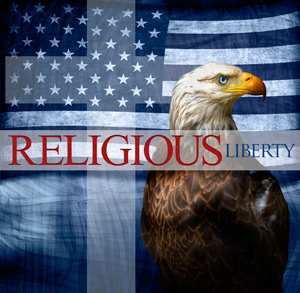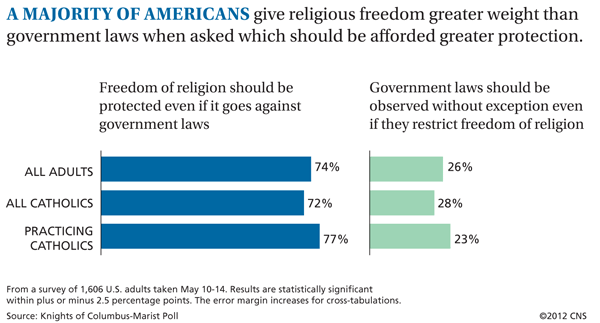NEW HAVEN, Conn. (CNS) — Nearly three-quarters of Americans in a Knights of Columbus-Marist poll said freedom of religion should be protected in this country, even if it conflicts with other laws.

The survey of 1,606 U.S. adults was conducted by telephone May 10-14, shortly before 43 dioceses and Catholic organizations filed suit in 12 federal courts against the Obama administration’s mandate that contraceptives, some abortion-inducing drugs and sterilizations must be provided free of charge in most health plans, even by employers that have religious objections.
Results of the survey were released May 22, a day after the lawsuits were filed.
In the poll, respondents were asked to choose which of two statements “comes closer to your view”: “Freedom of religion should be protected even if it goes against government laws” or “Government laws should be observed without exception even if it restricts freedom of religion.”
Overall, 74 percent of the respondents agreed with the first statement and only 26 percent agreed with the second. Support for the first statement was highest among Republicans (86 percent) and those who described themselves as conservative or very conservative (84 percent), but even 60 percent of those who said they were liberal or very liberal said freedom of religion should be protected.
Strong majorities also said health professionals and organizations should be permitted to opt out of participating in procedures they oppose for religious reasons. By a margin of 58 percent to 38 percent, poll respondents said these individuals and groups should be able to opt out of providing abortions; a smaller majority (51 percent to 46 percent) said they should be allowed to opt out of prescribing or dispensing birth control.
But 88 percent of the survey respondents — and 77 percent of the self-described practicing Catholics who took part in the survey — said it was morally acceptable to use contraceptives to prevent pregnancy.
More than half of the respondents also said individual health care providers and organizations should be able to opt out of providing: abortion-inducing drugs (51 percent), in vitro fertilization treatments that could result in the death of an embryo (52 percent) and medication to speed the death of a terminally ill patient (55 percent).
“This survey reveals that the American people are fundamentally dedicated to protecting the First Amendment conscience rights of everyone,” said Carl A. Anderson, supreme knight of the New Haven-based Knights of Columbus.
“Allowing people to opt out of these procedures or services — which violate their faith — is the right thing to do,” he added. “It is also key to protecting the First Amendment rights of all Americans and enjoys strong public support as well.”
The survey also asked whether respondents think U.S. laws in the past few years have “made it easier or harder for people to live according to their religious beliefs.” More than half (52 percent) said it had become harder, 31 percent said it was easier and 17 percent were unsure.
A large majority (72 percent) said it was morally wrong to require medical professionals to perform legal abortions against their religious beliefs. Only 27 percent said it was morally acceptable, and 1 percent said it was not a moral issue.
Asked about the abortion issue in general, 58 percent said it was morally wrong, 40 percent said it was morally acceptable and 2 percent said it was not a moral issue.
Opinion was more closely split on the issue of same-sex marriage, which 52 percent said was morally wrong, 45 percent said was morally acceptable and 2 percent said was not a moral issue.
The margin of error for the survey was plus or minus 2.5 percentage points, but it was larger for subgroups.







